Time to Honor Our April 14, 2004 Commitments to Israel
Bush and Congress: No return to 1949 Armistice Lines, Recognize Israel as Jewish state.
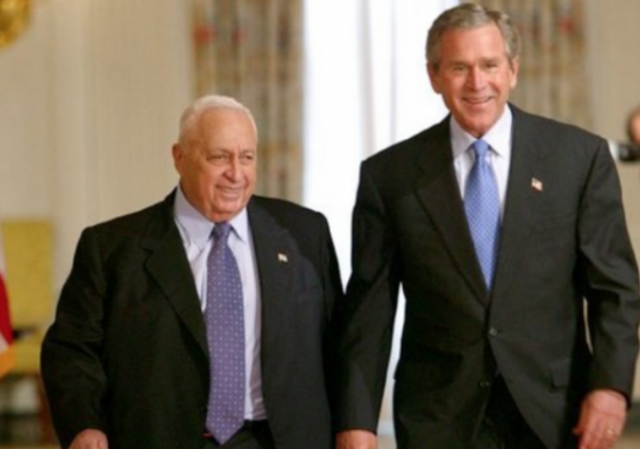
Twelve years ago President George W. Bush delivered a two-page letter to the late Israeli Prime Minister Ariel Sharon.
The exchange took place at a White House press conference on April 14, 2004.
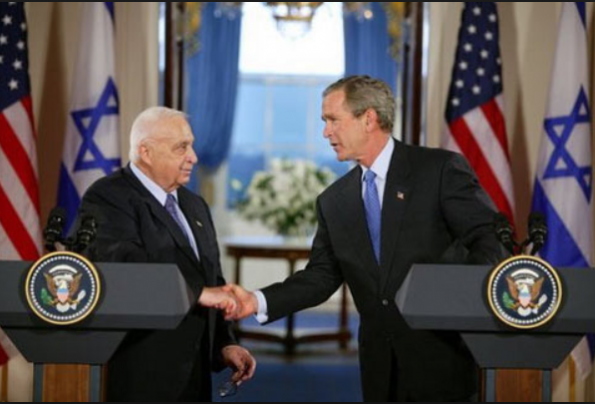
President George W. Bush and PM Ariel Sharon, Cross Hall, White House press conference, April 14, 2004 | credit: White House archives
Later, Congress would add its support to the letter’s terms by lopsided margins—95 to 3 in the Senate on June 23 and 407 to 9 in the House of Representatives on June 24.
The Bush Letter to Sharon
A recent op-ed published by Israel National News (Arutz Sheva) notes the significance of the document:
The letter backed Israel’s unilateral disengagement from Gaza and promised to support Israel’s following positions in negotiations with the Palestinian Authority over the previous 11 years:
- Israel would not cede its claims to all of the territory captured from Jordan in the 1967 Six Day War
- Millions of Palestinian Arabs would not be resettled in Israel and
- Israel must be recognized as the state of the Jewish people.”
Basically, George W. Bush understood that Israel shouldn’t be required to retreat to indefensible borders, transfer hundreds of thousands of Jews out of their homes, or absorb 5 million Palestinians claiming to be descendants of those Arabs who had lived in pre-1948 Palestine because doing all of that would result in the demise of Israel as a Jewish state—the basis of its foundation.
The Arabs were having none of that.
Reactions to the letter at the time were predictably “sour”. The Palestinian Prime Minister (Abu Ala’a) reportedly viewed it as legitimizing Israel’s settlements and dismissed it out of hand. And the head of the Arab League called the Bush letter “negative and very regrettable”.
In reality the letter didn’t signal a major break with past U.S. policy.
Previous U.S. administrations had also accepted that there would be no return to the 1949 armistice lines (the so-called Green Line) because Israel would keep some of the settlements.
As Glenn Kessler of the Washington Post notes, even before the 2004 Bush-Sharon letter, U.S. Presidents had generally “steered clear” of saying that “negotiations should start on the 1967 lines”:
Starting with President Lyndon Johnson, right after the Six-Day War, U.S. Presidents have often shown great sympathy for the Israeli contention that the pre-1967 dividing line did not provide security”.
So the letter just “set forth publicly” something that had already been widely acknowledged by the U.S. government: the 1967 lines weren’t a useful starting point for negotiations.
Here’s a new short video clip with commentary on this issue by Amb. Baker who participated in the negotiations on the Oslo Accords:
Obama Abandons the Bush-Congress Commitments
Bush’s letter was “immediately enshrined” by Israel as U.S. commitments that would undoubtedly be cited in future negotiations.
But the Obama administration refused to acknowledge the letter as binding on U.S. policy. Shortly after his inauguration, President Obama “cavalierly dismissed” it.
In June 2009 Secretary of State Clinton bizarrely insisted that “in looking at the history of the Bush administration, there were no informal or oral enforceable agreements”.
Harvard’s Martin Kalb writes about this “betrayal” in his book on U.S. presidential commitments:
Obama’s new secretary of state, Hillary Rodham Clinton, put a nail [in the coffin of] the Bush-Sharon exchange of letters by immediately making it clear that the Obama administration wanted no part of them. The letters, she announced, ‘did not become part of the official position of the United States government.’ And that was that”.
Why the Next President Should Reinstate the Bush Letter to Sharon
The Bush-Congress commitments to Israel should be revived for at least three reasons:
Security for Israel in a dangerous region. Given the region’s ongoing meltdown and chaos—a rising Iran, threats from transnational jihadists and Hezbollah, the absence of a single Arab democracy, and ongoing unstable political and security situations in Gaza and the West Bank—it’s time to jettison unrealistic expectation that Israel can afford a full and complete return to the indefensible armistice lines of 1949. Restating the Bush-Congress letter would reaffirm America’s commitment to Israel’s security and the well-being of the Jewish state at a perilous time, giving it the backing it needs to take new risks for peace.
Jumpstarting the peace process. As Michael Oren, Israel’s ambassador to Washington between 2009 to 2013, notes in a thoughtful op-ed last year (in Hebrew), the “disappearance” of the Bush-Sharon letter has done a grave disservice to the cause of peace.
It’s meant that every time Israel “built a kindergarten in Ma’ale Adumim” the Palestinians saw themselves as authorized to break off talks.
And it gave John Kerry the opportunity to “point to the building of a few hundred apartments in Jerusalem’s Gilo neighborhood as the reason that negotiations between Israel and the Palestinians collapsed” (translation mine).
The reality is that the primary stumbling block to peace has been Palestinian intransigence and a persistent unwillingness to make reasonable compromises. Reinstating the Bush-Congress letter would make it clear that the U.S. is no longer willing to pressure Israel to respond to “inflated” Palestinian demands.
Reaffirming the two-state solution. At a time when there’s a growing global agenda which denies the Jewish people’s national rights in the land of their beginnings, reinstating the Bush-Congress letter would provide a powerful counterweight to ongoing efforts to delegitimize the Jewish state and the national aspirations of her people.
Conclusion
A letter from a U.S. President to an Israeli Prime Minister might not seem like a big deal.
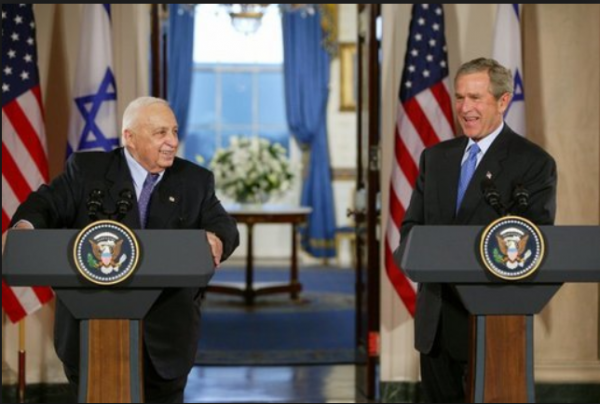
President George W. Bush and PM Ariel Sharon, Cross Hall, The White House, April 14, 2004 | credit: White House archives
In fact, the Bush letter was incredibly valuable since it helped Sharon win domestic public approval for his Gaza disengagement plan. Of course, Sharon may have taken this risky and unprecedented move even in the absence of the White House’s support. But the letter made it an easier sell:
the prime minister of Israel relied on [the letter] in undertaking a wrenching political reorientation—the dissolution of his government, the removal of every single Israeli citizen, settlement and military position in Gaza, and the removal of four small settlements in the West Bank. This was the first time Israel had ever removed settlements outside the context of a peace treaty, and it was a major step”.
In the absence of a binding mutual defense treaty with the United States, on matters of national security—when Israel is directly threatened and its fate may hang in the balance—the country depends on such presidential letters to “find reassurance” of what it can expect from its most important ally.
It’s something former Republican presidential candidate Marco Rubio (R-Fla) understood well.
Speaking at the Republican Jewish Coalition (RJC) Presidential Candidates Forum in Washington, D.C. back on December 3, Rubio pledged to
revive the common-sense understandings reached in the 2004 Bush-Sharon letter and build on them to help ensure Israel has defensible borders”.
Consider it one more reason to regret his failed campaign.
[Note: This post draws on Elliott Abrams’ masterful book, Tested by Zion (2013) which chronicles the “inside story” of the Bush administration’s approach to the Israeli-Palestinian conflict. Abrams served as an assistant secretary of state during the Reagan administration and was the Middle East Affairs point-man at the National Security Council from 2001-2009].
Featured Image: President George W. Bush and Prime Minister Ariel Sharon, The White House, April 14, 2004. Credit: White House Archives.
—————————————
Miriam F. Elman is an associate professor of political science at the Maxwell School of Citizenship & Public Affairs, Syracuse University. She is the editor of five books and the author of over 60 journal articles, book chapters, and government reports on topics related to international and national security, religion and politics, the Middle East, and the Israeli-Palestinian conflict. She also frequently speaks and writes on the Boycott, Divestment, and Sanctions (BDS) anti-Israel movement. Follow her on Twitter @MiriamElman
 DONATE
DONATE
Donations tax deductible
to the full extent allowed by law.

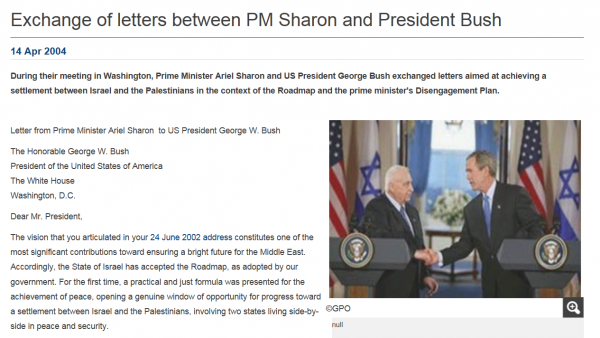


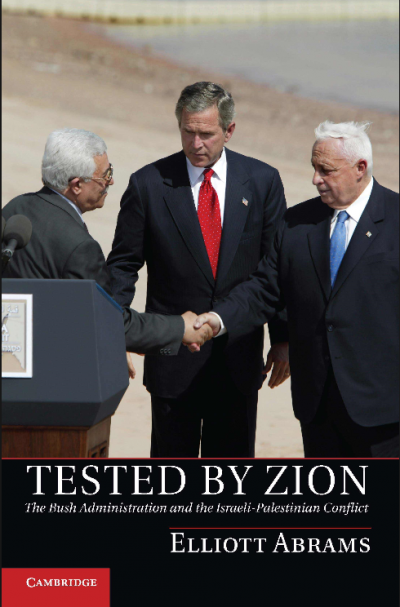







Comments
Although I disagreed with Pres. Bush on numerous things, I really miss him now. This is one of the reasons I do, his unwavering support of Israel. And his love of the American people and his country.
Recognize Israel as a “Jewish State”? The Supreme Court would never allow that. The Israeli Supreme Court.
Too true. The Israeli judiciary is Israel’s #1 enemy.
A letter from one president is never binding on his successors. It’s not even binding on him. 0bama’s private agreement with Iran will not bind his successor, and there’s no reason Bush’s letters should bind anyone either.
The next president should not support a two state solution. Bush was the first president to openly support this, and he set a terrible precedent. The next president should declare that a “Palestinian” state is no longer on the table, and the Arabs had better negotiate for what they can get before they lose even more. (Or at most, he should announce that they have six more months to negotiate a state, before the option disappears forever.)
The ambassador Baker video is excellent. The longer discussion of borders and the careless introduction of terms into current useage is a key to many problems in the world today, not just Israeli borders, and a tactic used constantly by our enemies.
His last comment is also important and is also applicable beyond the Isreali-Palestinian problem. We Western Civilization democracies are far too timid in making the case for ourselves. We are too quick to apologize, an Obama trait. Moral equivalency may be good for debates, but the fact remains that in many aspects of life and living – most perhaps – some ways are just better than the others. We should get back into the business of exporting ours.
Millhouse
Bush’s commitment to Israel was more than just a “letter” for the following reasons:
1. It was given to procure Israel’s unilateral disengagement from Gaza
2. The terms of that letter were endorsed by the Senate 95-3 on June 23 2004 and 407-9 in the House of Representatives on 24 June 2004.
Israel has paid – and is paying – a high price for its disengagement from Gaza. America needs to stand by these Bush-Congress endorsed commitments to Israel – not try to shamefully weasel out of them as Obama,Kerry and Clinton have sought to do.
Rubio to his credit has called on America to honor those commitments. Trump, Cruz and Kasich need to do likewise.